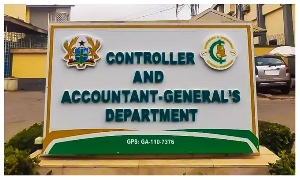“Researchers at Singapore’s Nanyang Technological University (NTU) have been working on ways to make towns and cities more sustainable by taking waste from housing and turning it into energy. The team created a new type of toilet system which turns human waste into biogas – which can be used for cooking and generating electricity – and biodiesel.”
–BBC Report
(Lesson from Singapore for persons in charge of the nation’s power and energy sector and liquid waste disposal)
Jerry John Rawlings as the then Head of State spent scarce national resources to celebrate Ghana @ 40 when there was nothing but poverty and deprivation to celebrate. John Agyekum Kufuor as the then Head of State followed in the ignominious footsteps of Rawlings and also spent scarce national resources to celebrate Ghana @ 50 when there was nothing to celebrate but poverty and deprivation. I wrote in this column criticizing the use of the scarce national resources on such unproductive ventures. Later on, both celebrations became the subjects of political warfare and vilification, which, had politics not been allowed to take the center stage, some persons would have been doing time behind bars by now for willfully causing financial loss to the state. And yet both President Rawlings and President Kufuor both led delegations of their respective governments to visit Singapore. Obviously no lessons were learnt otherwise there would have been no need for the two presidents to have wasted scarce resources celebrating a ’no event’.
This year Singaporeans are celebrating Singapore @ 50. Ghana achieved independence eight years ahead of Singapore. At independence, Ghana was richer in terms of natural and human resources than Singapore. Ghana had a per capita far greater than that of Singapore. Singapore was an impoverished tiny colony with no natural resources, not even drinking water. Today, Singapore is one of the richest first world countries while Ghana is one of the poorest third world countries. I wish to reproduce part of the BBC report on Singapore @ 50 for discerning, and well-informed minds to contrast with Ghana @ 40 and Ghana @ 50. After reading this BBC report, any objective and independent minded person will understand why Ghana can never make it with the type of corrupt, incompetent, greedy, myopic, visionless criminals who portray themselves as leaders ruling over hen-pecked, docile, meek, boot-licking, sycophantic, supine and cowardly citizens behaving like waifs and strays.
Please read on and pass your own judgment.
Singapore is a hi-tech, wealthy city-state in south-east Asia, also known for the conservatism of its leaders and its strict social controls. The country comprises the main island – linked by a causeway and a bridge to the southern tip of Malaysia – and around 50 smaller islands. Once a colonial outpost of Britain, Singapore has become one of the world’s most prosperous places – with glittering skyscrapers and a thriving port. Most of its people live in public-housing tower blocks. Singapore is often referred to as one of Asia’s economic “tigers”. Singapore became independent when it was ejected from the Federation of Malaya amid social unrest. In 50 years, the former British colony has transformed itself into one of the world’s wealthiest countries.
Its economy is driven by electronics manufacturing and financial services and has weathered regional crises, including the 1997 Asian markets slump, the 2003 Sars virus outbreak and the 2009 world banking crisis. In the face of strong competition from regional manufacturers, Singapore is seeking to strengthen its services sector and tourism industry. Singaporeans enjoy one of the world’s highest standards of living, but also a system of punishments for acts deemed to be anti-social. Singapore argues that its use of capital punishment – applied mostly to drug
trafficking offences – has stopped the growth of narcotics syndicates.
Government-led initiatives have been aimed at boosting the birth-rate and encouraging Singaporeans to be more courteous. Citizens are urged to “Speak Good English” in place of a local slang known as “Singlish”. Chinese make up more than 75% of the community; Malays and Indians make up much of the remainder. There are many foreign workers, and according to a government forecast published in 2013, by 2030 immigrants will make up nearly 50% of the population.
Although Singapore is a multi-party nation, the People’s Action Party (PAP) has been the dominant force since independence, regularly winning well over 60% of the vote. But its critics say the rapid development has been accompanied by a strict control on free speech and politics. Despite achieving such goals as 90% home ownership and per capita GDP above US$56,000, critics continue to point to the strict political controls. The ruling People’s Action Party (PAP) has been in power for more than 50 years and the opposition hopes to make more inroads in elections that could be called in September. The last election saw the PAP suffer its worst performance, though it still kept 80 of the 87 seats. It is hoped the boost of the anniversary and recognition of the legacy of Lee Kuan Yew will help it at the next election.
Singapore is holding nationwide events to mark 50 years since it became an independent state. Tens of thousands of people are expected to attend an outdoor parade, complete with flybys by the air force and a Singapore Airlines A380 airliner. Singaporeans are also being asked to join together in reciting the national pledge and singing the national anthem
Singapore is celebrating 50 years of independence and everywhere you look in the city, there are posters, banners, bus ads and post boxes marking the event. The government-led brand sums up the jubilee with the acronym SG50. It is the city state’s biggest and most expensive effort to drum up nationalist fervour. The celebrations will culminate on 9 August, National Day, the date of Singapore’s independence 50 years ago. An extravaganza costing nearly $15m (£9.6m) will take place on the historic Padang – the large field in the middle of the city – as well as on a platform that overlooks the picturesque waterfront where 150,000 people are expected to fill the stands and watch from the city centre. The show has been put together by 12,000 participants and crew – among the highlights will be 20 fighter jets forming the number 50 in the sky.
Opinions of Friday, 21 August 2015
Columnist: Kwame Gyasi














